George Kitchin
George Kitchin | |
|---|---|
 Kitchin by Lewis Carroll (1859) | |
| Warden of the University of Durham | |
| In office 1894–1908 | |
| Preceded by | William Lake |
| Succeeded by | Frank Jevons |
| Chancellor of the University of Durham | |
| In office 1908–1912 | |
| Preceded by | New creation |
| Succeeded by | Henry Percy, 7th Duke of Northumberland |
| Dean of Durham | |
| In office 1894–1912 | |
| Preceded by | William Lake |
| Succeeded by | Hensley Henson |
| Personal details | |
| Born | 7 December 1827 Naughton, Suffolk, United Kingdom |
| Died | 13 October 1912 (aged 84) Durham, County Durham, UK |
| Alma mater | Christ Church, Oxford, King's College London |
| Profession | Dean, Academic and Warden |

George William Kitchin (7 December 1827 – 13 October 1912) was the first Chancellor of the University of Durham, from the institution of the role in 1908 til his death in 1912. He was also the last Dean of Durham to govern the university.
Kitchin was born to a minister in the Rectory at Naughton, Suffolk. He attended King's College School and King's College London. Later, he attended Christ Church, Oxford where he took a Double First in Classics and Mathematics in 1850 and gained his Master of Arts (Oxford) (MA Oxon) in 1852.[1] In 1854, Kitchin was an examiner in Mathematics at Christ Church.[2] Kitchin left Oxford to become Headmaster of Twyford Preparatory School in Hampshire but returned to residence at Oxford as Censor in 1861. While at Christ Church he was partly responsible[3] for the end in late 1861 of the Latin Prayer, conducted there since time immemorial, and for which special provision had been given in the Act of Uniformity 1662. Kitchin married in 1863, and served as Oxford's first Junior Censor of non-collegiate students from 1868 to 1883. He was Select Preacher at Oxford from 1863–64, Whitehall Preacher from 1866–67. Resided at Brantwood, in the Lake District from 1869–71,[4] the property later purchased by John Ruskin.[5] Here he untook assignments for Clarendon Press, including working on the proofs of Richard Cleasby and Gudbrand Vigfusson's Icelandic-English Dictionary.[5]
Appointed Chaplain to William Jacobson, Bishop of Chester from 1871–72, tutor of Frederik, Crown Prince of Denmark (later Frederick VIII of Denmark) and lecturer and tutor in History in Christ Church from 1870-83. He was also Commissary to Charles Sandford, Bishop of Gibraltar from 1874–1904, and was an Honorary Fellow of King's College London, and an honorary student of Christ Church. In theology he was a moderate liberal.[1]
In 1883, he became Dean of Winchester and in 1894 became the Dean of Durham.[2] At Oxford his friends included John Ruskin and Lewis Carroll.[6] Kitchin's daughter Alexandra ('Xie', 1864–1925) was Carroll's favourite photographic subject.
While Dean of Winchester he was responsible for a number of refurbishments within the Cathedral, most notably, the restoration of the mediaeval reredos behind the High Altar, usually known as 'The Great Screen'. The restoration was initially entrusted to the architect J D Sedding. However, Sedding's design for the scheme did not meet with general satisfaction and was not implemented. Thereafter Kitchin personally took over and master-minded the entire project, essentially as his own architect, commissioning the many new statues needed to people the restored screen. When completed this was widely acclaimed as a major artistic ecclesiastical restoration of the 19th century.
His son, George Herbert Kitchin (1870-1951), was a prolific architect, especially in Hampshire, as well as being a botanist and garden architect.
Kitchin wrote the hymn 'Lift High the Cross' in 1887 for a Missionary Service in Winchester Cathedral.
Kitchin described several biblical manuscripts: Uncial 0132, minuscule 73, Minuscule 506, Minuscule 507, and Minuscule 639.
Works
- Catalogus codicum MSS. qui in bibliotheca Aedis Christi, Oxford 1867.
- Bacon's Novum Organum (2 vols., Oxford, 1855)
- Bacon's Advancement of Learning (London, 1860)
- Catalogue of Manuscripts in the Library of Christ Church, Oxford (Oxford, 1867)
- A History of France (3 vols., 1873–77); Life of Pope Pius II. (1881)
- Winchester Cathedral Records (2 vols., Winchester, 1886)
- Documents Relating to the Foundation of the Chapter of Winchester, A.D. 1541-1547 (London, 1889)
- Winchester (1890)
- Rolls of the Obedientaries of St. Swithin's Priory, A.D. 1309-1534 (Winchester, 1895)
- The Manor of Marydown, Hampshire (1895)
- Edward Harold Browne, Bishop of Winchester: A Memoir (London, 1895)
- Ruskin in Oxford, and other Studies (1904).
References
- ^ a b Kitchin on the Christian Classics Ethereal Library at Calvin College website
- ^ a b Kitchin on the 'Centre for Church Music' website
- ^ Thomson, Henry Lewis (1899). Henry George Liddell, D.D., dean of Christ church, Oxford. J. Murray. p. 153.
- ^ Wiki article - Brantwood
- ^ a b Ellwood, Thomas (1894), The Landnama Book of Iceland, pp. i
{{citation}}: Missing or empty|title=(help) - ^ Clarke, Garth, Michael Cardew, London: Faber and Faber, 1976. ISBN 0-571-11305-2.
External links
![]() Works by or about George Kitchin at Wikisource
Works by or about George Kitchin at Wikisource
- 1912 deaths
- 19th-century English Anglican priests
- People educated at King's College School, Wimbledon
- Alumni of King's College London
- Fellows of King's College London
- Alumni of Christ Church, Oxford
- Fellows of Christ Church, Oxford
- Deans of Winchester
- Deans of Durham
- School principals and headteachers
- Chancellors of Durham University
- Vice-Chancellors and Wardens of Durham University
- 1827 births
